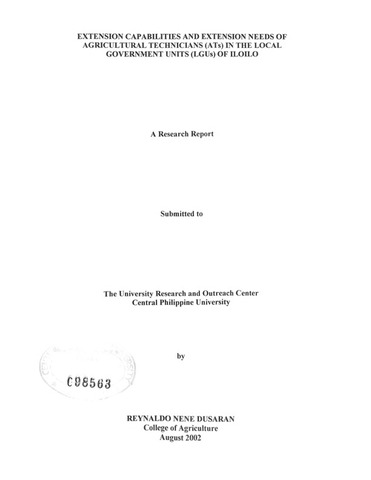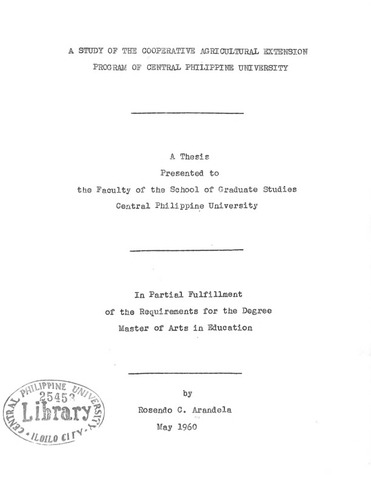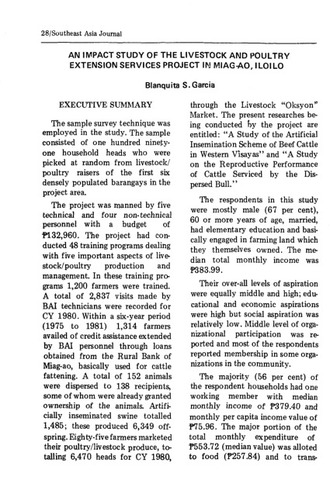Extension capabilities and extension needs of agricultural technicians (ATs) in the local government units (LGUs) of Iloilo
| dc.contributor.author | Dusaran, Reynaldo N. | |
| dc.coverage.spatial | Iloilo | en_US |
| dc.date.accessioned | 2021-05-11T03:24:25Z | |
| dc.date.available | 2021-05-11T03:24:25Z | |
| dc.date.issued | 2002-08 | |
| dc.identifier.citation | Dusaran, R. N. (2002). Extension capabilities and extension needs of agricultural technicians (ATs) in the local government units (LGUs) of Iloilo (Research report). Jaro, Iloilo City: University Research Center, Central Philippine University. | en_US |
| dc.identifier.uri | https://hdl.handle.net/20.500.12852/845 | |
| dc.description | Abstract only | en_US |
| dc.description.abstract | This study was conducted to assess the level of extension capabilities, extension needs, extension practices and extent of agricultural technology extension made by the agricultural technicians (ATs) in the local government units (LGUs) in the Province of Iloilo and their relationship with the extent of agricultural technology adopted or practiced by the farmers and the consequent level of social changes in the farmers’ communities. A descriptive-correlational study was used to achieve the above objectives. A researcher-made questionnaire which was duly validated and pretested was distributed/administered to 205 target respondents from 26 sample municipalities of the five congressional districts of the Province of Iloilo but in the process, only 183 or 89.27 percent returned their completed questionnaires. To supplement the data generated from the ATs, 250 farmers, 50 from each sample municipality for each of the five districts in the province were also interviewed by trained interviewers. All the data collected were electronically processed using the Statistical Package for the Social Sciences (SPSS) software. Descriptive analysis made use of frequency and percentage distributions, and appropriate measures of central tendency while correlational analysis made use of Analysis of Variance (ANOVA) - Multiple Classification Analysis (MCA) and partial correlation analysis. The findings show that the ATs have a high overall extension capability and most of them have a moderate level of capability in all of the nine aspects of extension considered in this study. To improve further extension capabilities, most of them (40.4 percent) suggested more training/seminar on extension capabilities. The ATs have a moderate level of extension needs satisfaction. They regarded salary/compensation package as their most important need and most of them are moderately satisfied with their salary, of which most of them are recommending better salary/compensation. They also regarded their respective LGUs as having moderate levels of organizational capability to support extension. In their extension activities, the ATs used an average of 5.05 extension practices as combination which can include farm/home visit, farmers classes, demo farm, farmers field school, tours, distribution of 1EC materials and method demonstration. These were partly corroborated by the farmer-respondents. The extent of extension that they have made was on the moderate extent and extent of farmers adoption was perceived by the ATs as low. Even with the low extent of adoption among farmers, yet majority of the ATs (69.4 percent) observed a moderate level of social changes in their areas of coverage while only 29.2 percent of the farmer-respondents claimed of the same level of social changes in their communities. These social changes includes changes in farming practices as a direct result of adoption of modem techniques in farming, increase production and income and improvement in living condition. For the relationships of variables in this study, ANOVA results reveal that the level of education of the ATs is significantly related to their extension capabilities, whereas, sex was significantly related to extension need satisfaction. Number of training attended by the ATs and their knowledge about extension is significantly related to the extent of extension made. The residence of the ATs, length of service and knowledge about extension are also significantly related to the number of extension practices used by the ATs in their extension activities. Partial correlation analysis reveal that extension capabilities, extension need satisfaction and organizational capability to support extension are highly significantly correlated. The analysis also show that the ATs’ extension capabilities and their extension need satisfaction are significantly related to their number of extension practices but only the ATs’ extension capabilities is found to be significantly related to the extent of extension that they have made. The analysis further revealed that the extent of adoption of farmers of agricultural technology are significantly related to the ATs extension capabilities and the extent of extension that they have made of these technology. The analysis finally show that the ATs’ extension capabilities, the extent of extension that they have made and the extent of adoption by farmers of agricultural technology are significantly related to the levels of social changes observed by the ATs in their areas of coverage. Based on the findings in this study, it is recommended that a training program for the ATs should be designed to improve the extension capability. This training program should focus on the different aspects of extension included in this study. The training program should also consider the findings of this study with respect to the training scheme preferred by the AT-respondents. It is also recommended that the effective number of target clients to AT ratio should be studied. If this can be determined, a review of the scope and coverage of the ATs would be in order. There is also a need among the ATs to consider the use of mass media in their extension practices to reach more of their target clients instead of capitalizing on individual or group contacts. Since the ATs’ extension capabilities, extension needs satisfaction and organizational capability to support extension are significantly interrelated, efforts towards improvement of the organizational capability of the LGUs to support extension activities should be considered. Improvement in the organizational capability of the LGUs would be very vital in increasing ATs’ extension needs satisfaction, particularly their salary/compensation package. Since most of the programs being implemented/extended by the ATs are nationally mandated programs, the national government should provide financial, technical and other necessary assistance to the LGUs in support of their extension activities. | en_US |
| dc.format.extent | xvii, 119 leaves. | en_US |
| dc.language.iso | en | en_US |
| dc.publisher | Central Philippine University | en_US |
| dc.rights | Attribution-NonCommercial-NoDerivs 3.0 Philippines | * |
| dc.rights.uri | http://creativecommons.org/licenses/by-nc-nd/3.0/ph/ | * |
| dc.subject.ddc | GSL 630.72 D94e | en_US |
| dc.subject.lcsh | Local government | en_US |
| dc.subject.lcsh | Agricultural extension work | en_US |
| dc.subject.lcsh | Agricultural extension workers | en_US |
| dc.subject.lcsh | Agricultural extension workers--Training of | en_US |
| dc.subject.lcsh | Agricultural extension workers--Evaluation | en_US |
| dc.subject.lcsh | Philippines--Iloilo | en_US |
| dc.title | Extension capabilities and extension needs of agricultural technicians (ATs) in the local government units (LGUs) of Iloilo | en_US |
| dc.type | Technical Report | en_US |
| dcterms.accessRights | Limited public access | en_US |
| dc.description.bibliographicalreferences | Includes bibliographical references | en_US |
| local.subject | Agricultural technicians | en_US |
Fichier(s) constituant ce document
Ce document figure dans la(les) collection(s) suivante(s)
-
Research reports [167]
-
Research reports [37]






